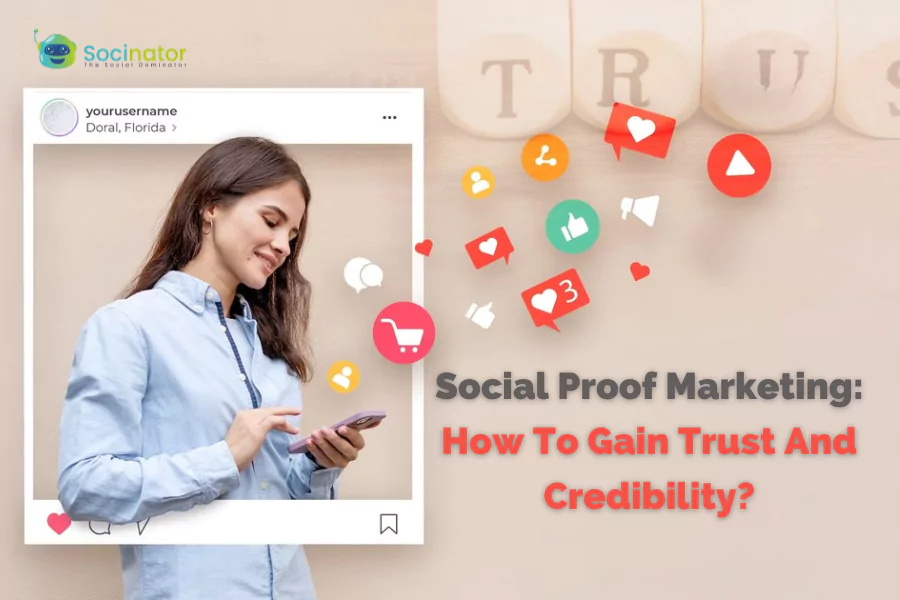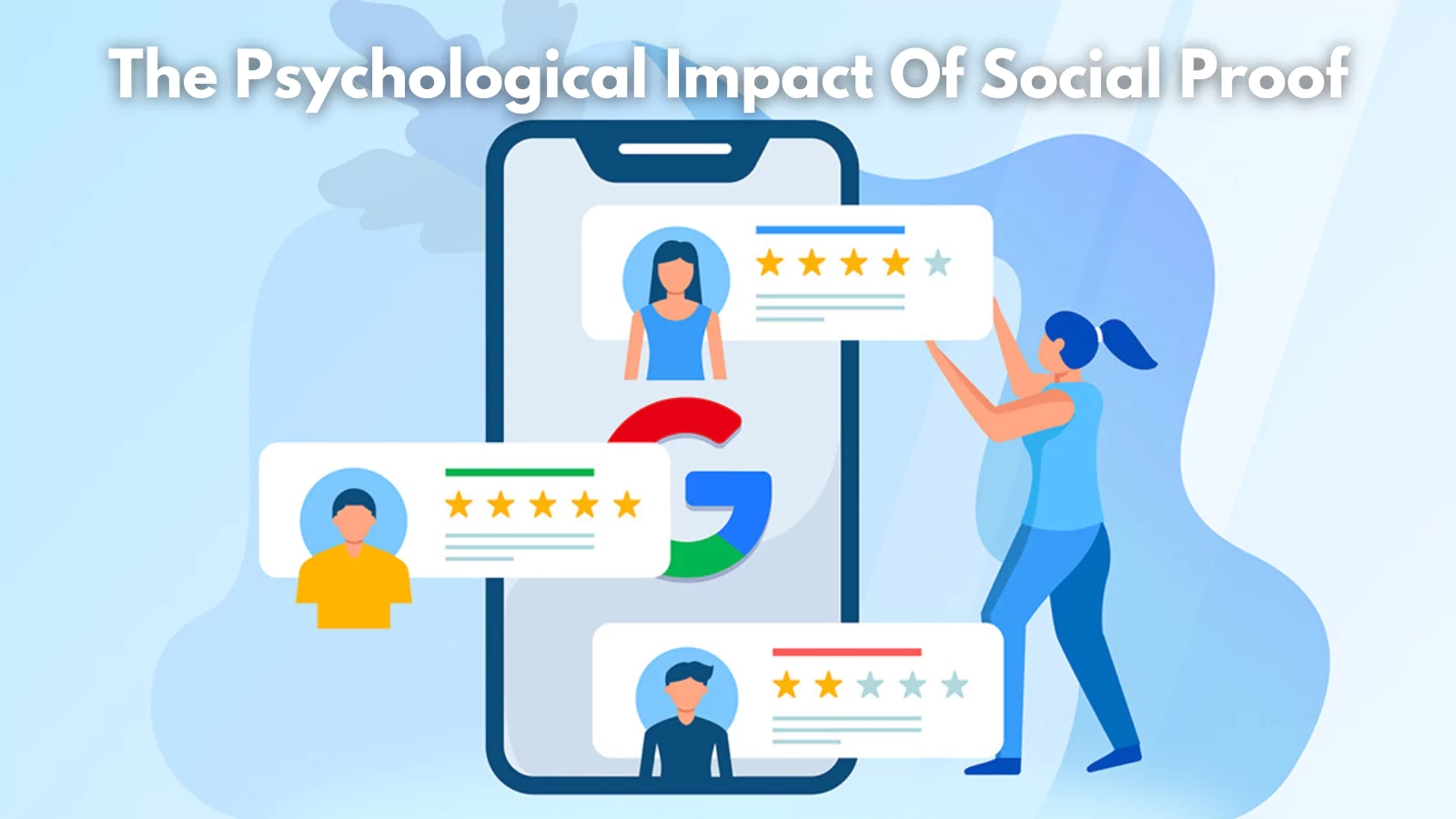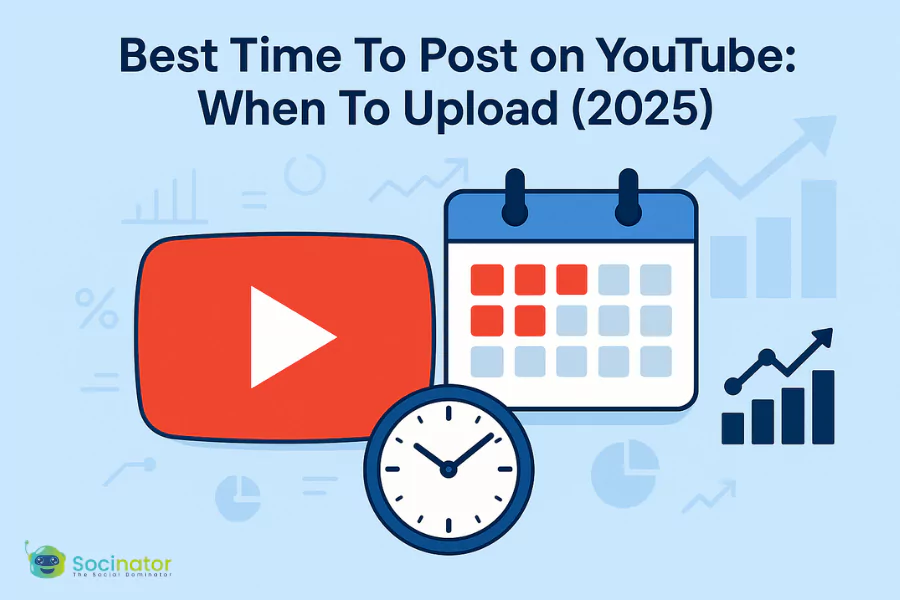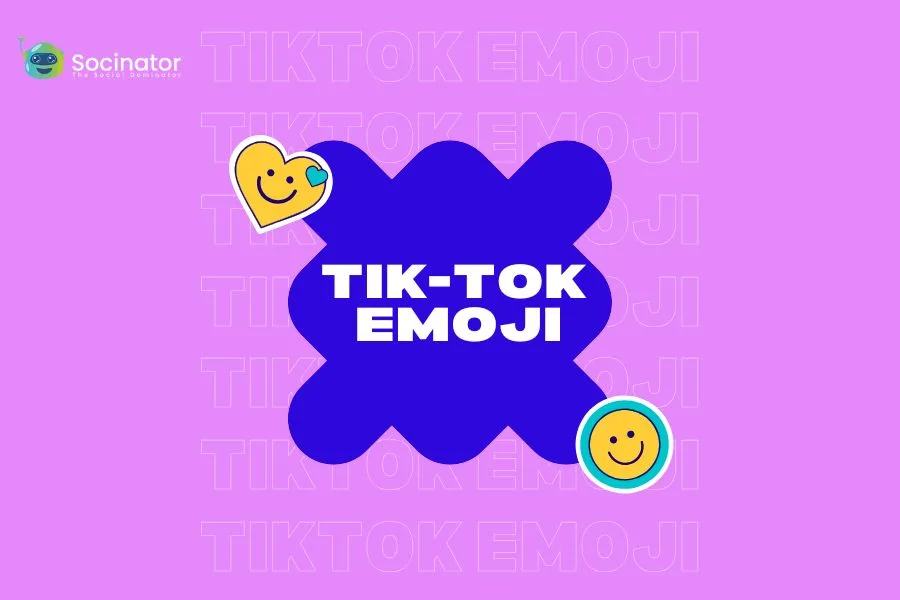In a world where consumer trust can make or break a brand, social proof marketing has emerged as a cornerstone to establish credibility and influence purchasing decisions. Whether it’s the sight of a packed restaurant, glowing online reviews, or a product endorsed by a favorite influencer, people are naturally drawn to choices validated by others. This phenomenon, known as social proof, is not only psychological but also a crucial tool for marketers aiming to build trust and boost sales.
This blog delves into what social proof marketing entails, its significance, and how you can effectively integrate it into your marketing strategy to achieve measurable results.
Listen To The Podcast Now!
What Is Social Proof Marketing?
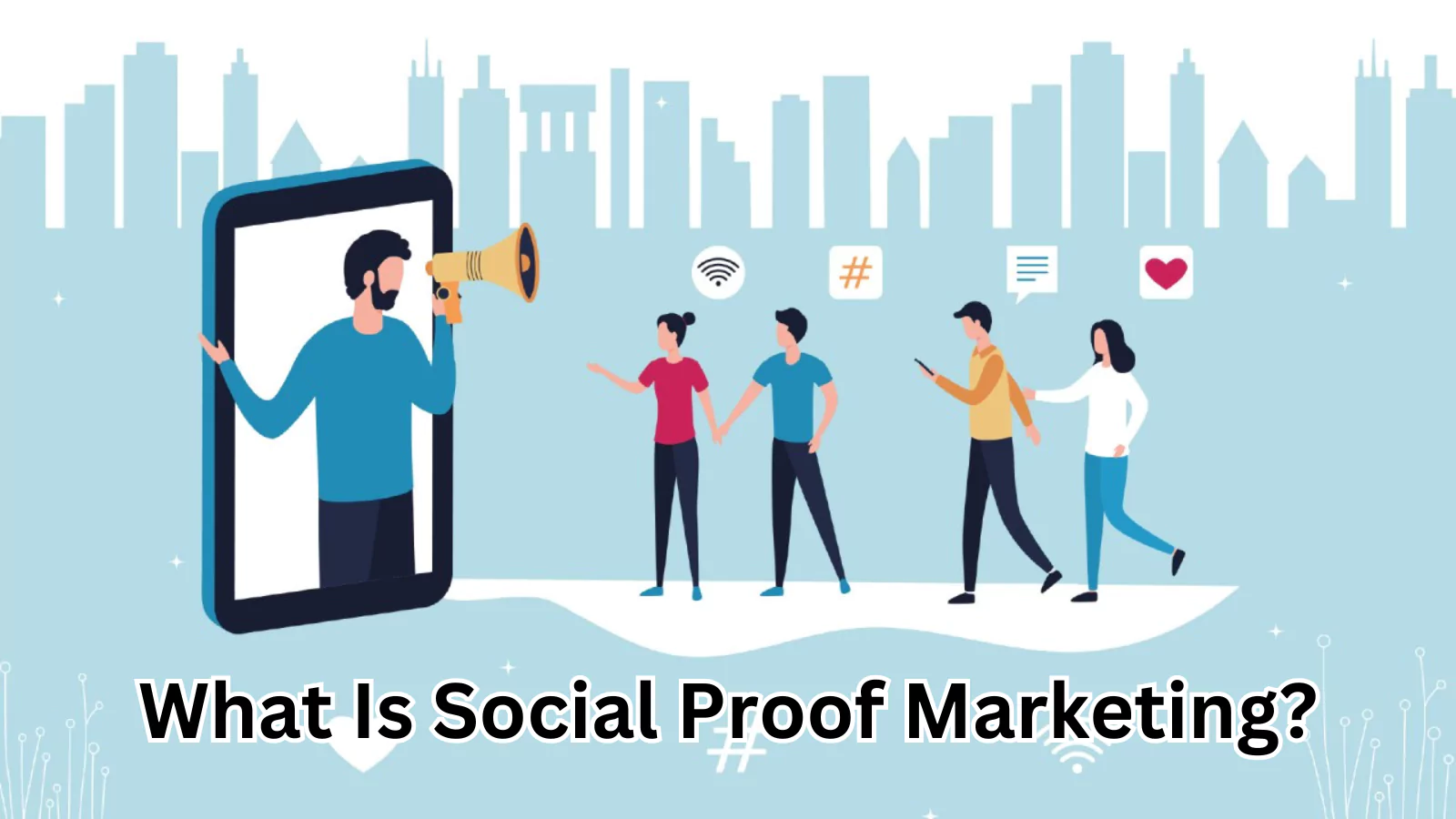 Before diving into actionable strategies, let’s break down what is social proof marketing truly. At its core, social proof refers to the idea that people tend to follow the actions of others, especially in uncertain situations. When applied to marketing, it’s the practice of leveraging customer behaviors, opinions, and experiences to influence potential buyers.
Before diving into actionable strategies, let’s break down what is social proof marketing truly. At its core, social proof refers to the idea that people tend to follow the actions of others, especially in uncertain situations. When applied to marketing, it’s the practice of leveraging customer behaviors, opinions, and experiences to influence potential buyers.
Examples of social proof in marketing include:
- Customer testimonials
- User-generated content (UGC)
- Celebrity endorsements
- Ratings and reviews
- Social media shares and mentions
By demonstrating that others trust and value your brand, you create a ripple effect, encouraging prospective customers to do the same.
Why Social Proof Marketing Works So Effectively?
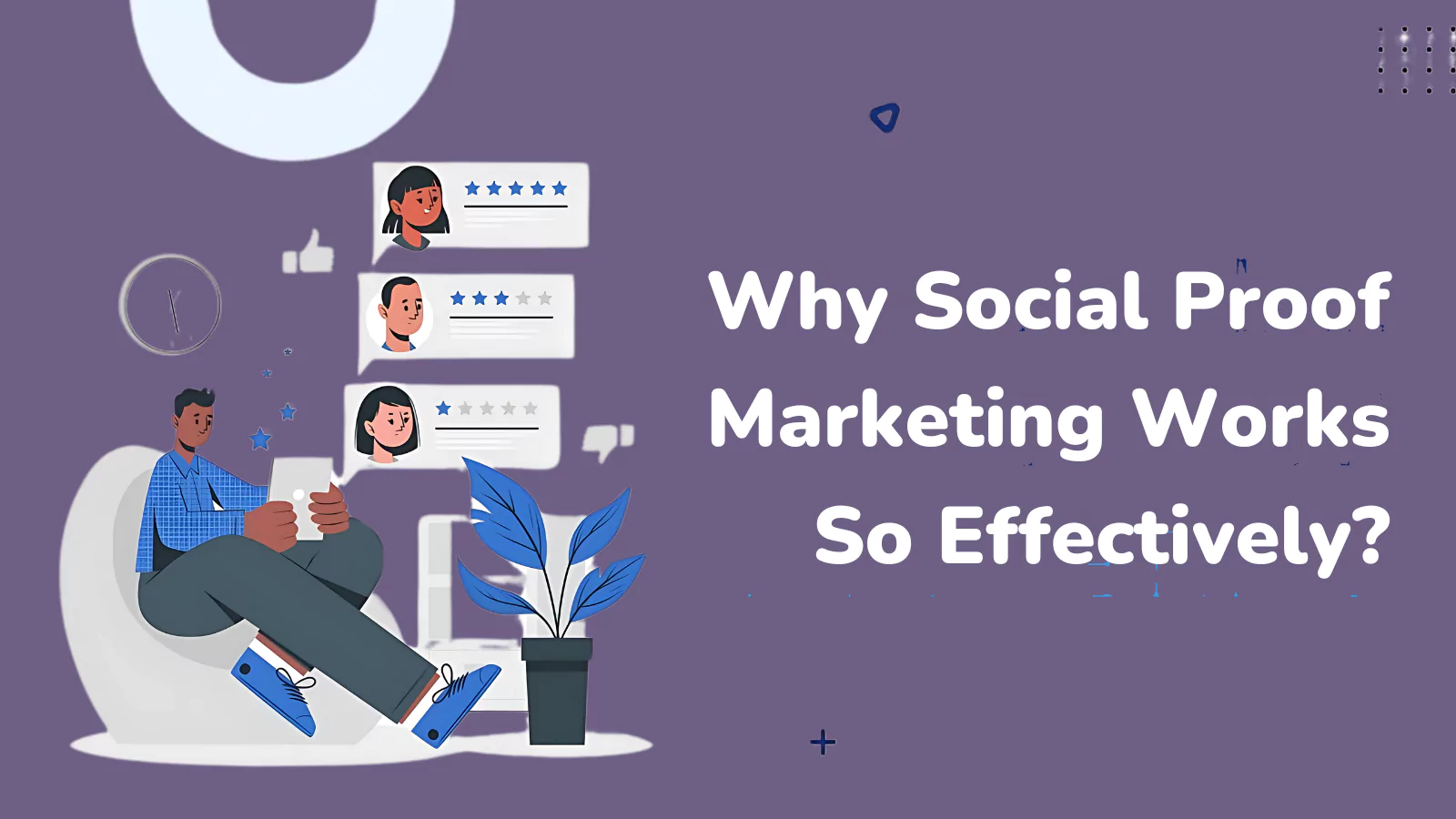 Social proof taps into fundamental human psychology—our desire for belonging, validation, and certainty. But why does it work so well in marketing? Let’s delve deeper into the key reasons behind its effectiveness.
Social proof taps into fundamental human psychology—our desire for belonging, validation, and certainty. But why does it work so well in marketing? Let’s delve deeper into the key reasons behind its effectiveness.
1. Builds Trust Instantly
Consumers are naturally more inclined to trust recommendations from their peers and real-life experiences over direct advertising. This phenomenon occurs because:
- Authentic Testimonials: When potential buyers see positive reviews or authentic user-generated content (UGC), it signals reliability and authenticity. These testimonials provide a genuine endorsement that feels more believable than polished marketing messages.
- Shared Experiences: Shared experiences create a sense of connection. When people see others benefiting from a product or service, it reassures them that they will likely have a positive experience too.
2. Reduces Decision Fatigue
In today’s world, customers are bombarded with choices. This overwhelming abundance of options can lead to decision fatigue, where making a choice feels exhausting. Social proof helps simplify this process by:
- Guiding Choices: A potential customer’s choice becomes significantly easier when they see others praising a product or service. It acts as a shortcut to making a confident decision.
- Minimizing Risk: Knowing that others have had positive experiences reduces the perceived risk involved in purchasing. It reassures people that they’re making a safe and well-informed decision.
3. Enhances Brand Credibility
Social proof also plays a crucial role in enhancing brand credibility through endorsements from influential figures:
- Influencer Endorsements: Collaborations with influencers, celebrities, or industry leaders serve as powerful endorsements. These figures often have dedicated followings that trust their opinions, and this trust transfers to the brand they endorse.
- Expert Reviews: Endorsements from experts or industry authorities position your brand as reputable and desirable. Expertise adds a layer of credibility that resonates with potential customers looking for reliable solutions.
The Psychological Impact Of Social Proof
- Herd Mentality: People often follow the actions of a larger group, assuming it leads to the correct decision. This effect, known as the herd mentality, is particularly strong in digital spaces where trending content and viral posts shape consumer behavior.
- Social Comparison: Individuals constantly compare themselves to others. Seeing others endorse a product or service can create a desire to conform and align with the perceived social norm. This mechanism is a powerful driver of consumer behavior.
- Authority Principle: Endorsements from authoritative figures, including experts and celebrities, carry significant persuasive power. People are more likely to trust recommendations from those they perceive as knowledgeable and credible.
Practical Examples Of Social Proof In Action
To illustrate how effective social proof can be, let’s look at some practical examples:
- Online Reviews: Amazon’s product pages prominently feature customer reviews and ratings. Many buyers rely on these reviews to make purchasing decisions.
- Social Media Engagement: Brands like Glossier leverage Instagram to showcase user-generated content, creating a community of loyal customers who actively share their experiences.
- Influencer Collaborations: Fashion brand Fashion Nova collaborates with influencers to showcase their products, resulting in increased credibility and sales.
Types Of Social Proof And How To Use Them
 To harness the power of social proof, understanding its various forms is essential. Each type caters to different aspects of consumer psychology and works best in specific contexts.
To harness the power of social proof, understanding its various forms is essential. Each type caters to different aspects of consumer psychology and works best in specific contexts.
1. Customer Testimonials
Customer testimonials remain one of the most trusted forms of social proof. Real customers sharing their positive experiences can create an emotional connection and build trust with potential buyers. Testimonials work particularly well on websites, landing pages, and email campaigns. Highlighting quotes or brief stories from satisfied customers can make your brand feel more relatable and authentic.
Pro Tip: Use a mix of video testimonials and written reviews to maximize engagement and provide a richer, multi-dimensional perspective of your brand.
2. User-Generated Content (UGC)
UGC, such as photos, videos, and social media posts from real customers using your product, is a highly authentic and engaging form of social proof. It not only validates your brand but also fosters a sense of community. Encourage your audience to share their experiences with branded hashtags, contests, or giveaways to amplify UGC.
Example: A skincare brand showcasing before-and-after photos submitted by users can demonstrate the effectiveness of their product while fostering credibility.
3. Ratings and Reviews
Studies show that 93% of consumers read online reviews before making a purchase, making ratings and reviews a vital aspect of social proof. Positive reviews provide reassurance, while detailed feedback offers transparency. Displaying an average star rating prominently on product pages, alongside specific testimonials, can directly influence purchasing decisions.
Pro Tip: Don’t shy away from addressing negative reviews professionally. It shows accountability and builds trust.
4. Social Media Proof
In the digital age, social media is a goldmine for building credibility. Every like, share, and mention is a signal that your product or service is valued by others. Actively engaging with your audience by resharing mentions or thanking users for their shoutouts can amplify this form of proof. Highlighting milestones, such as the number of followers or trending hashtags, further reinforces your brand’s popularity.
Example: A coffee shop celebrating its 10,000th followers on Instagram by offering discounts creates buzz and validates its wide customer base.
5. Influencer and Celebrity Endorsements
Collaborating with influencers or celebrities who resonate with your brand values can dramatically expand your reach and boost credibility. Their loyal followers often trust their opinions, making their endorsement a powerful driver of conversions.
Pro Tip: Focus on micro-influencers with a highly engaged audience in your niche to achieve better ROI compared to celebrity endorsements.
6. Certifications and Badges
Displaying certifications, awards, or badges from recognized authorities adds another layer of credibility. These symbols signify that your product meets certain standards, which can reassure skeptical customers.
Now that you’re familiar with the types of social proof, let’s explore how to seamlessly incorporate them into your marketing campaigns to maximize results.
Incorporating Social Proof Into Your Marketing Strategy
 Implementing social proof in your marketing strategy can significantly enhance your brand’s credibility and influence consumer behaviors. Here’s how you can seamlessly integrate social proof into your marketing efforts:
Implementing social proof in your marketing strategy can significantly enhance your brand’s credibility and influence consumer behaviors. Here’s how you can seamlessly integrate social proof into your marketing efforts:
1. Leverage Social Media
Social media platforms are the perfect stage for showcasing social proof in marketing. Here’s how you can maximize their potential:
- Share User-Generated Content (UGC): Encourage your followers to share their experiences with your product or service. Repurpose this content across your social media profiles to create authentic and relatable posts.
- Customer Shoutouts: Highlight customer testimonials and success stories. Tagging and celebrating your customers not only makes them feel valued but also shows potential customers real-life endorsements.
- Influencer Collaborations: Work with influencers who resonate with your brand values. Their endorsements can amplify your reach and add a layer of authenticity to your social proof efforts.
2. Add Social Proof to Your Website
Your website is a crucial touchpoint for potential customers. Adding social proof elements can instill trust and encourage conversions:
- Testimonial Sliders: Display rotating testimonials from satisfied customers prominently on your homepage or landing pages. This dynamic presentation keeps the content fresh and engaging.
- Review Sections: Integrate comprehensive review sections for each product or service. Allow customers to leave detailed feedback, and highlight top reviews to provide immediate legitimacy.
- Case Studies: Develop in-depth case studies that showcase the value your product or service has delivered to real clients. Use these success stories to illustrate tangible benefits and outcomes.
3. Use Real-Time Notifications
Real-time notifications can create a sense of urgency and add an element of dynamic authenticity to your website:
- Recent Purchases: Tools that display notifications of recent purchases can reassure visitors that your products are in demand. Seeing others buy the same product can nudge hesitant shoppers toward making a purchase.
- Live Visitor Counts: Showcasing how many people are currently viewing a product or browsing your site can create a buzz and encourage quick action.
- Sign-Up Activity: Displaying notifications of new sign-ups or registrations can validate your platform’s popularity and usefulness.
4. Highlight Numbers
Showcasing impressive statistics can reinforce trust and credibility in your audience:
- User Numbers: Highlight the number of users or customers who have engaged with your product or service. Metrics like “10,000+ satisfied customers” can make a strong impact.
- Download Figures: If you offer a digital product, showcasing the number of downloads can demonstrate widespread acceptance and trust.
- Satisfaction Rates: Use statistics that reflect high satisfaction rates, such as “95% customer satisfaction” or “98% retention rate,” to underscore your product’s reliability and quality.
Streamlining Your Social Proof Marketing
 At this point, you might wonder: is there a way to streamline these strategies? This is where Socinator comes into the picture. Socinator is an intuitive social media management software designed to help you automate and optimize your social media marketing efforts, making it easier to incorporate and manage social proof.
At this point, you might wonder: is there a way to streamline these strategies? This is where Socinator comes into the picture. Socinator is an intuitive social media management software designed to help you automate and optimize your social media marketing efforts, making it easier to incorporate and manage social proof.
- Automated Content Sharing: Schedule and automate the sharing of user-generated content and testimonials across your social media platforms.
- Performance Metrics: Track and analyze the performance of your social proof campaigns to identify what resonates with your audience.
- Centralized Management: Manage your social proof elements from a single dashboard, ensuring consistency and efficiency.
By leveraging Socinator, you can seamlessly integrate social proof into your marketing strategy, enhance your brand’s credibility, and foster deeper connections with your audience.
Simplify Social Proof Marketing With Socinator
Socinator, a powerful social media automation software, automates tasks like scheduling posts, engaging with followers, and tracking metrics—allowing you to focus on creating and leveraging social proof effectively.
Key Features of Socinator
1. Content Automation: Schedule posts showcasing UGC, reviews, and influencer collaborations effortlessly
2. Audience Engagement: Monitor and respond to customer interactions to maintain trust and credibility.
3. Advanced Analytics: Track the performance of your social proof campaigns to optimize your strategy.
4. Multi-Platform Management: Handle social proof across multiple channels from a single dashboard.
By streamlining your social media efforts, Socinator empowers you to focus on building trust and scaling your business.
Measuring The Success Of Social Proof Marketing
 No strategy is complete without measuring its impact. Tracking the right metrics allows you to evaluate the effectiveness of your social proof marketing and refine your approach for better results. Here are key metrics to monitor:
No strategy is complete without measuring its impact. Tracking the right metrics allows you to evaluate the effectiveness of your social proof marketing and refine your approach for better results. Here are key metrics to monitor:
Engagement Rates
Engagement rates are essential indicators of how well your social proof content resonates with your audience. Keep an eye on:
- Likes and Reactions: High numbers of likes and positive reactions signal that your content is well-received.
- Shares: Shares indicate that your audience finds the content valuable enough to share with their networks. It amplifies your reach and further validates your brand.
- Comments: Monitor the sentiment of the comments. Positive comments reflect approval, while questions and constructive feedback can provide insights into areas for improvement.
- User-Generated Content (UGC): Track the volume and quality of UGC. An increase in UGC suggests that customers are actively engaging with your brand and willing to share their experiences.
Conversion Rates
Evaluating how social proof influences your sales and conversions is crucial. Focus on these aspects:
- Testimonials and Reviews: Assess the impact of testimonials and reviews on your conversion rates. Are customers more likely to purchase after reading positive feedback?
- Influencer Campaigns: Measure the effectiveness of influencer partnerships. Track referral links and discount codes to see how many conversions result from these collaborations.
- A/B Testing: Conduct A/B tests for landing pages and product pages that feature social proof versus those that don’t. This will help you understand the direct impact of social proof elements on customer behavior.
Traffic Sources
Understanding how social proof content drives traffic to your website provides valuable insights into its effectiveness:
- Referral Traffic: Analyze referral traffic to see which social proof sources generate the most visits. This includes traffic from social media platforms, review sites, and influencer blogs.
- Organic Traffic: Track changes in organic traffic resulting from improved online reviews and testimonials. Positive social proof can enhance your search engine ranking and visibility.
- Direct Traffic: Measure direct traffic to gauge the effectiveness of real-time notifications and social proof elements on your website.
Continuous Analysis and Improvement
Regularly analyzing these metrics ensures that you refine your social proof marketing approach and achieve better results over time. Consider the following practices:
- Feedback Loops: Create feedback loops to collect insights from your audience about what types of social proof they find most compelling.
- Adjust Strategies: Be prepared to adjust your strategies based on performance data. If a particular influencer campaign yields high engagement but low conversions, you might need to rethink your approach.
- Stay Updated: Keep an eye on emerging trends and technologies in social proof marketing. This will help you stay ahead of the curve and continuously improve your efforts.
Also Read,
Social Media Engagement Rate – Ultimate Guide
Social Media Content Strategy: Ultimate Tips And Examples
Wrapping Up: The Power Of Social Proof Marketing
Social proof is more than a trend— a timeless strategy rooted in human psychology. By showcasing authentic customer experiences, leveraging UGC, and collaborating with credible voices, you can build trust, drive conversions, and elevate your brand’s reputation.
Ready to take your social proof marketing to the next level? Start implementing these strategies today and watch your brand thrive.
FAQ: Social Proof Marketing
- How can I measure the effectiveness of my social proof marketing?
To measure the success of your social proof efforts, track key metrics like engagement, conversion rates, and customer feedback. Analyzing the impact of testimonials, reviews, and user-generated content on your sales or website traffic can give you a clear idea of how well it’s working. - Is social proof only effective for large brands, or can small businesses benefit too?
Social proof is valuable for businesses of all sizes. Small businesses can leverage authentic customer reviews, case studies, or influencer partnerships to build credibility and trust with potential customers, often more effectively than larger brands due to their personal touch. - Can I use social proof marketing in industries where customer testimonials are rare or difficult to gather?
Yes! If gathering traditional customer testimonials is challenging, consider alternative types of social proof like social media mentions, product usage statistics, or influencer endorsements. These can still provide powerful validation for your brand. - What are the best types of social proof to use for e-commerce websites?
For e-commerce, product reviews, ratings, and user-generated content (like photos or videos of customers using the products) are some of the most effective forms of social proof. Displaying these prominently on product pages and checkout pages can drive more conversions. - Can I automate social proof marketing efforts to save time?
Yes, many platforms allow you to automate the collection and display of reviews, ratings, and testimonials. You can set up automated requests for customer feedback after purchase or integrate with social media tools to automatically showcase user-generated content.

